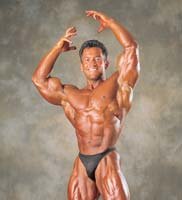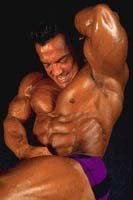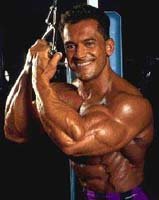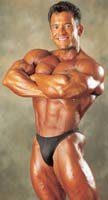Water retention is a phenomenon that can affect every competitive bodybuilder. Young or old, beginner or seasoned, competing or non-competing, every bodybuilding athlete must understand water retention if optimum conditioning is to be achieved.
Unfortunately, the subject of water retention is poorly understood by all but a select few professional bodybuilding athletes and those who train them, and any available information is seldom accurate.
In this interview, I sat down with pro bodybuilding legend and Labrada Nutrition CEO Lee Labrada to discuss water retention and how it's best managed.
But, why Lee Labrada? It's simple: over the course of his long career, this IFBB Professional Bodybuilding Hall of Fame member never placed lower than 4th in seven consecutive Mr. Olympias and always brought a hard, dry, quality physique to the stage. If anyone knows about water retention, it's Lee Labrada.
In this interview, Lee Labrada shares his knowledge on controlling water retention.

The Interview

[ CS ] Lee, thank you for taking the time to sit down and do this interview.
[ LL ] Thank you, Clayton. It's great to be here, sharing my experience and knowledge. I really want to help other bodybuilders get into great shape.

[ CS ] Today we're talking about water retention, which is a huge topic and one that certainly affects every bodybuilder, whether it's the competing athlete or the non-competing athlete. Let's start by making it clear: what exactly is water retention?
[ LL ] Water retention from the bodybuilder's perspective is a temporary condition in which the body is retaining extra fluid. In other words, unwanted fluid is marring or hiding the muscularity, which is an undesirable condition, especially at the time of competition.

[ CS ] With this working definition, what exactly happens with water retention at the cellular level?
[ LL ] Well, there are a number of factors that influence it and it's a complex process.
These factors include excess sodium intake and hormone imbalances such as those that are suffered by bodybuilders who are using or abusing anabolic steroids.
Water retention can be caused by certain drugs and medications that your doctor prescribes and it can also be caused by injury. All of these things can lead to electrolyte imbalances and disruptions of the compartments where water should be. Again, from a bodybuilder's perspective, we want the least amount of subcutaneous (under the skin) water in order to achieve maximum muscularity.
Typically, water retention is a temporary situation that's remedied by the kidneys within a short time, but these extenuating factors can cause longer-lasting imbalances.

[ CS ] So, then, far from just having one simple cause like insufficient water intake for example, it's clear that training factors are important because of their effects on hormones, other conditions, and that dietary factors with respect to sodium are important.
[ LL ] That's exactly right. In fact, you mentioned training within the context of inflammation. Overtraining itself can cause the imbalance, and your body responds with water retention.

[ CS ] So a stressful training schedule and the stresses that come with competition for example, would put a competing bodybuilder at especially high risk for water retention at the worst time.
[ LL ] Yes, you must be very careful. The body responds to a stimulus or factor which triggers the water retention. The whole process involves a complex feedback loop between the kidney and the rest of the body.
The body uses ADH or anti-diuretic hormone to modulate the water balance in the body on a short-term basis. It also employs a hormone called aldosterone to modulate water longer-term. But, these body functions are typically way beyond the bodybuilder's control, to the extent that they can't control how the body releases these hormones.
What bodybuilders can do, however, is manipulate dietary factors, water intake and sodium intake and the like to maximize the potential of getting the water into the desired compartment in the body. From a bodybuilder's perspective, the most desirable compartment for the water to be in is in the intracellular compartment - water inside the muscle cells - instead of extracellular, or outside the muscle cells.
Any water that is inside of the muscle will definitely impact the perceived size and density of the muscle, and any water that is outside can obscure definition, perceived muscle hardness and conditioning.

[ CS ] When you are getting ready for a show, which of the factors that we just talked about is the most significant?
[ LL ] There are actually two, and they're related: sodium and water. Assuming that you have not screwed up your electrolyte imbalance with anabolic steroids, diuretics or other drugs, and assuming that your stress is not out of control, the factors which impact the water levels in your body the fastest are your sodium and water intake.
These are important to watch, especially during the last week leading up to a show. It's important to realize that sodium cannot be maintained at ultra low levels for more than about 48 hours before the body responds accordingly and starts telling the kidneys to retain sodium and water.
So, bodybuilders who cut their sodium intake many weeks in advance of a competition are really doing themselves a disservice because it doesn't take your body more than a couple of days to correct the situation. After a couple of days, you actually start retaining sodium and water because the body is going to maintain its homeostatic balance no matter what - it's a survival mechanism.

[ CS ] This seems to explain reports we often hear about bodybuilders peaking and looking their best the day before or after the show. Would you say that peaking at the wrong time is mostly due to not understanding sodium?
[ LL ] Yes. Sodium, electrolytes and fluid levels. Water follows sodium. So, if the short-term sodium levels in the body are within a normal range, your water is also going to be within a normal range and you're not going to have any excess water retention. But, if your sodium intake is high, your body is going to have a "puffy" appearance because it is going to retain more water to deal with the sodium.

[ CS ] Let's talk a bit about water retention as it relates to body mass calculations. All bodybuilders are concerned with accurately calculating their body mass values so that they can adjust their training and nutrition strategies accordingly. How would you say that having high levels of water retention can throw off your body mass calculations?
[ LL ] Well, it can give you a false read on the true body mass because if you are retaining an extra five or ten pounds of fluid, and if you're calculating your body mass index using measurements taken by body fat calipers, you're not going to get a true read of the body mass that you're carrying. The water retention will exaggerate any readings that you get.
In this case, a false read might lead you to make faulty assumptions about what your caloric intake should be, putting you at risk for body fat gain.
I always advise bodybuilders to keep diet logs, recording their total caloric intake on a daily basis so that they can later make adjustments to their caloric intake by as little as a couple of hundred calories per day. Then, through trial and error, they're going to know what they need to eat in order to drop body fat and to increase body weight.

[ CS ] Perfect. Let's talk about nutrition and supplementation within the context of water retention. We mentioned that nutrition factors and supplementation factors can influence the behavior of water in the body. In your experience, how do these two factors affect water retention?
[ LL ] Macronutrients - carbs, proteins, and fats - are going to contain some naturally occurring sodium. So, by manipulating the foods you eat, you can manipulate your sodium intake.
Nutrition impacts your sodium intake considerably - you should be choosing lower sodium foods, especially during the last few days before a competition. Additionally, there are certain micronutrients such as vitamin C, B-Vitamins, and minerals - which are helpful for both their diuretic effect and for keeping fluid in the right places.

[ CS ] Now that we've talked about low-sodium foods, let's talk about two or three supplements that affect water retention. Creatine is definitely one that affects the behavior of water in your body as it is highly hydrophilic and attracts water. What are some supplement ingredients that should be avoided if you want to reduce water retention?
[ LL ] Let's start with creatine. Creatine pulls water into muscle, so that's a good thing and not necessarily a bad thing. I would recommend, however, that bodybuilders get off of creatine in the last week before a competition just to make sure that they're not carrying any excess water subcutaneously.
Other supplements that help include glutamine - one of the amino acids that your muscles use the most. Glutamine is a good supplement that acts as a partitioning agent, helping water into muscle.
As for things which should be avoided, again, sodium is the biggest culprit and sometimes competitors inadvertently take extra sodium in, simply because they're tap or unfiltered water. So, my advice is always to drink spring water because it's lower in sodium, plus it usually contains traces of beneficial minerals.

[ CS ] What did you do immediately prior to a show or a photo shoot to minimize water retention? How did you come in with the kind of dry, shredded and conditioned physique for which you had a reputation?
[ LL ] Thank you, Clayton. Typically, in the weeks leading up to a show, I would keep my daily average sodium intake at about 2500 to 3000 mg per day. To give you a reference point, many ordinary Americans eat in excess of 10,000 mg of sodium per day in some cases, which is just a crazy amount of sodium. I believe that you must consume a certain amount of sodium for your body to function correctly, but it's not as much as you would think.
Consuming 2500 mg to 3000 mg of sodium daily worked well for me. It was easy to track my sodium intake with a sodium counter. A sodium counter is a little book that contains the sodium content of all kinds of different foods which are available in our food supply.
You can get a sodium counter at any bookstore. Along with calories, I logged the sodium content of all the foods I ate everyday in my daily log. By doing this, I was able to get a total sodium count for the day.
Whenever I had a pending photo shoot or competition, coming up, I would cut my sodium down to about 700 mg - 800 mg per day, about 48 hours before. I would keep my fluid intake high during this time. The net result was that my body would continue to pump out sodium and water and I would get dry and tight looking within a short amount of time.
Once you get into this state, you can only hold it for about 24 hours before your body starts retaining sodium and fluid to bring itself back into a physiologically desirable balance.
Again, your body does not care what it looks like - it cares about survival, and it works within a narrow range - one you're not going to be able to get it out of very easily or for very long. However, the natural way I'm describing is the healthiest and easiest way of getting into this condition temporarily.
Some bodybuilders resort to the use of diuretics to get their body into this state. Unfortunately, this can have disastrous consequences. I have personally known of at least one professional bodybuilder who passed away because of diuretic use immediately after a show. No show is worth your life, guys.

[ CS ] So, if diuretics are going to be used, they must be used with a full understanding of the risks involved ...
[ LL ] Well, to be quite frank, my advice is to not use them at all. Although, the majority of competitive bodybuilders will use them, it's something I stayed away from. Consequently, I was able to learn my body and come in hard, naturally, and it was never hit and miss like it is when you take the chemical route.
My method was predictable and that is why I was always able to peak. That is also why I always had energy when I was on stage. I could stay "locked and loaded" in a flexed relaxed pose, so that any time the judge's eyes came to me, my muscles looked rock hard and my abs were tight.
I felt strong because I was well hydrated, unlike my counterparts who were literally dying of exhaustion. Chemical diuretics do that to you - they can literally drain you not just of the water in your body but also your strength.

[ CS ] What other tips and tricks can you offer to combat water retention?
[ LL ] On the days leading up to the show, drinking three to four quarts of spring water is best. Do not drink distilled water and do not drink tap water. It's hard to gauge the sodium content of tap water. Distilled water will actually leech electrolytes out of your body. By leaching water out of your muscles, distilled water can make you appear flat.
I used to do something on the day of the show that I called WIWO - water in, water out.
On the day of the show, whenever I had to urinate, I would go into a measuring cup and measure how much water I excreted from my body. I would then drink an equal amount of clean spring water. So, if I lost 8 ounces of fluid, I would immediately drink 8 ounces of clean spring water to replace the lost volume of liquid. This helped me to hold the look that I wanted throughout the day.

[ CS ] What is your view on some of the last minute tricks that you hear about? Things like homemade concoctions of glycerol, red wine and the like that bodybuilders employ on the day of the show?
[ LL ] I think that it's playing with matches. What I mean by that, Clayton, is that bodybuilders go to great trouble to get into fantastic shape, and this takes a lot of work. And, then, they are glib about trying different things at the last minute.
I think it's playing with fire - you can ruin 12 weeks of hard work and planning simply by doing something your body is not accustomed to. If you did not use glycerol or red wine while getting into shape, why would you drink that on the day of the show? You simply do not know how your body will respond!
I think approaches like this are antiquated, and I think that most of these "tricks" are old wive's tales, and they do not have a place in the modern bodybuilder's arsenal.

[ CS ] We've covered a lot of ground on water retention and we've talked about nutrition and supplementation. Of course, the readers can find even more information on nutrition, supplementation and even exercise and water retention in your book The Lean Body Promise.
[ LL ] In the book, I talk about everything. I provide a nutrition plan, I give an exercise plan, and a cardio plan. I pull all of the information together - it's a really neat book.
Another great resource is Get Lean, and this is a book that I co-authored with my nutritionist partner Keith Klein. This book is actually made for pre-contest bodybuilders. It is literally a step-by-step, connect-the-dots 12 week plan that any bodybuilder can follow.
If followed perfectly, they are guaranteed to come in rock-hard, dry and in-shape on the day of the show. We've just had phenomenal success with this program. It comes with a DVD, fat calipers and charts—everything you need to get dialed in.

[ CS ] As the CEO of a nutrition company, you offer a wide-range of nutritional supplements to help bodybuilders of all ages and from all walks of life get in to great shape. For someone who wants to eliminate water retention, what supplements from your line are low in sodium and are great for coming in looking good?
[ LL ] Protein intake is critical for muscle growth and great health in general. Our Pro V60 protein blend powder is great for use any time of the day because of the multiple types of protein and the extended amino acid release - it's also low in sodium with only 80 mg per serving.
In addition, our Lean Body MRPs are great and convenient and contain only 150 mg per serving. These two products are ideal and are safe for bodybuilders who want to limit sodium and come into their best condition. Our SuperCharge! pre-workout NO energy drink has only 10mg of sodium and is perfect for getting your energy and pump up during those difficult pre-contest workouts.

[ CS ] So, Lee, are there any other thoughts that you would like to share about water retention with the readers?
[ LL ] Yes.
- Do it naturally and learn how your body works. Learn about the ebbs and flow of fluid in your body. Doing it this way, you'll get a harder and cleaner look that will be more sustainable and you'll come into your show with fuller muscles than if you use chemical diuretics.
- Water is your friend. A lot of times, I see bodybuilders dehydrating themselves for days in advance of a show. This is the worst thing you can do because muscles are 80% water, so at the same time you're dehydrating yourself subcutaneously, you're also dehydrating your muscles.
The key to controlling your subcutaneous fluid is to control the sodium intake during the 48 hours prior to the show, drinking plenty of spring water to wash excess sodium out. I always say, "If you want to lose water, give your body water."
On the day of the show, control the water intake and just drink when you are thirsty. Use the water in water out method that I described. Keep in mind that controlling your water is no substitute for being in great shape. Nothing - including diuretics and dehydration - is going to take the place of having low body fat levels.
Conditioning can only be accomplished over weeks and weeks of training and dieting, and last-minute dehydration is not going to make up for that. So, before you worry about your fluid levels, make sure that you are in great shape.

[ CS ] Thank you, Lee, for this amazing interview.
[ LL ] Thank you, Clayton, for this opportunity. I look forward to sharing more with the readers of Bodybuilding.com very soon!






